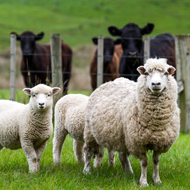
NSA and NFU raise farmers' concerns
Farmers are calling on Natural England to commit to a full consultation in the event of a formal application to reintroduce Eurasian lynx to the UK.
Lynx UK has identified Kielder Forest, Northumberland, as a preferred trial reintroduction site for the species, but has not so far submitted an application to the licencing authorities.
Now the NSA and the NFU, who are representing farmers in Scotland and England, say that farmers’ justified concerns ‘must be taken seriously’.
They disagree with the suggestion that consultation work undertaken by Lynx UK would meet the legal requirement for an official and independent review.
Furthermore, the organisations stress the importance of an application being made to the licensing bodies in both nations. They argue that it is unacceptable for any release to proceed without both sides being given a chance to participate in discussions.
“A thorough, independent evaluation of any proposals put forward is what farmers in the local area expect,” said NFU regional director Adam Bedford. “This is an area almost wholly dependent on sheep farming and times are tough. Any unnecessary additional pressure on these fragile businesses is simply unacceptable and the government must respond accordingly.”
Farmers are concerned that lynx will negatively impact sheep farming businesses without being guaranteed to bring any gains in terms of environment or tourism.
“Sheep are an essential part of the economic, environmental and societal jigsaw in rural areas,” commented Phil Stocker, NSA Chief Executive. “Put this one vital piece at risk and the whole structure is threatened, biodiversity is reduced, cultural and heritage is lost, and the rural landscape changes.”
The NSA has published a report on the wider consequences of the Introduction of Eurasian Lynx to the UK, which is available at nationalsheep.org.uk.



 RCVS Knowledge has welcomed Professor Peter Cockcroft as editor-in-chief for Veterinary Evidence.
RCVS Knowledge has welcomed Professor Peter Cockcroft as editor-in-chief for Veterinary Evidence.